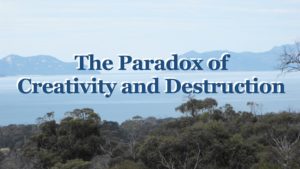The Paradox of Creativity and Destruction
Based on the books:
- Paradoxes of Group Life, by Kenwyn and Berg, and
- The Brain that Changes Itself, by Norman Doidge
Audio available here: https://soundcloud.com/swedenborgcommunity/the-paradox-of-creativity-and-destruction
From Heavenly Secrets, paragraph 9723, by Emanuel Swedenborg, on Exodus 27:
‘And you shall make [its] pans to take away [its] ashes’ [verse 3] … ‘ashes’ means the kinds of things which remain in a person’s natural or external memory after they have served their purpose and which must be removed lest they get in the way of other things which come later to serve further purposes. … From early childhood right through to the end of his life in the world a person is being perfected in intelligence and wisdom, and if all is to go well for him, in faith and love. Items of factual knowledge contribute primarily to this end and purpose. These items of knowledge are absorbed through hearing, seeing, and reading, and are deposited in the external or natural memory; they serve inward sight or that of the understanding as a whole field of objects from which to choose and draw forth such as will help to make the person wiser. … From the many different items there it chooses and draws forth such as are suited to its own love; it summons them from there and deposits them in its own memory, which is the internal memory, …This is how the life of the internal man develops, along with its intelligence and wisdom. … After the items of knowledge or the cognitions of good and truth in the external man’s memory have served that purpose they disappear so to speak from that memory. They are like the things taught to a person which have served since early childhood as the means to perfect his private life and his public life. After those things have served that informative purpose and the person has begun to live as they direct, they fade from view in the memory; only the practice of them remains. In this way a person learns to speak, learns to think, learns to discriminate and form opinions, learns to be honourable in dealings with others and to behave politely. In short, he acquires languages, good manners, intelligence, and wisdom. …
Recorded on Sunday 22 August 2021.

